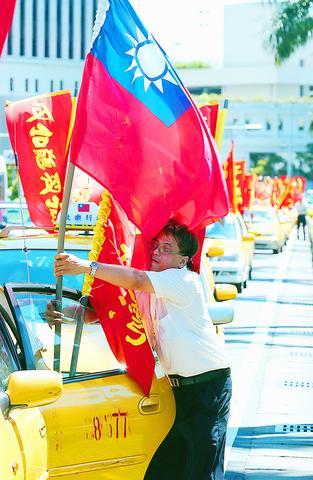Thousands took to the streets to pronounce their anti-independence stance yesterday after Saturday's march calling for the Republic of China (ROC) to adopt "Taiwan" as its official name.
Demonstrators in yesterday morning's event defended the ROC name, and activists in a separate march in the afternoon called on citizens to "oppose Taiwan independence in order to save Taiwan."

PHOTO: SEAN CHAO, TAIPEI TIMES
The scale of yesterday's two rallies, however, was far short of Saturday's demonstration, which organizers estimate drew up to 150,000. According to the Taipei City Police Department, about 7,000 joined the morning rally, and over 3,000 participated in the afternoon march.
The crowd in the morning rally, most of whom were carrying ROC flags, gathered at the Sun Yat-sen Memorial Hall.
Both Chiang Fang Chih-yi (
"Whoever said that the Republic of China does not exist anymore is an enemy of the state. We can never let other countries think that rectifying Taiwan's name is what the Taiwanese majority wants," Chiang said.
"The Republic of China lives on Taiwan, Penghu, Kinmen and Matsu. It was established as the first democratic and free country in Asia through the efforts of Dr. Sun Yat-Sen and many others. The country was established in 1911 and that is a historical fact," she said.
Yok said that he loved the Republic of China and those attending the march.
"No one here approves of rushing reunification. Those rushing independence are really rushing reunification," Yok said.
Meanwhile, the march in the afternoon was convened by the pro-communist Chinese Unification Alliance (
"We want to ask the government to drop the budget for military purchases and use the money for better welfare instead since China is really not an enemy. We also want a better economy," said Hsieh Hsiang-wen (謝向文), spokesman for the alliance.
The alliance also condemned what it sees as the US and Japan's manipulation of Taiwan, saying the two countries were trying to encourage Taiwan's independence and the separation of Taiwan from China.
Many high-school students, absent from most political activities in the country, attended the march. But when asked why they went to the event, many said they were urged to do so by their friends.
"We want to be sunny teenagers," said one student.
Another said, "A friend urged us to come so we came along. It's fun and my friends get to be together."

MAKING WAVES: China’s maritime militia could become a nontraditional threat in war, clogging up shipping lanes to prevent US or Japanese intervention, a report said About 1,900 Chinese ships flying flags of convenience and fishing vessels that participated in China’s military exercises around Taiwan last month and in January last year have been listed for monitoring, Coast Guard Administration (CGA) Deputy Director-General Hsieh Ching-chin (謝慶欽) said yesterday. Following amendments to the Commercial Port Act (商港法) and the Law of Ships (船舶法) last month, the CGA can designate possible berthing areas or deny ports of call for vessels suspected of loitering around areas where undersea cables can be accessed, Oceans Affairs Council Minister Kuan Bi-ling (管碧玲) said. The list of suspected ships, originally 300, had risen to about

DAREDEVIL: Honnold said it had always been a dream of his to climb Taipei 101, while a Netflix producer said the skyscraper was ‘a real icon of this country’ US climber Alex Honnold yesterday took on Taiwan’s tallest building, becoming the first person to scale Taipei 101 without a rope, harness or safety net. Hundreds of spectators gathered at the base of the 101-story skyscraper to watch Honnold, 40, embark on his daredevil feat, which was also broadcast live on Netflix. Dressed in a red T-shirt and yellow custom-made climbing shoes, Honnold swiftly moved up the southeast face of the glass and steel building. At one point, he stepped onto a platform midway up to wave down at fans and onlookers who were taking photos. People watching from inside

Japan’s strategic alliance with the US would collapse if Tokyo were to turn away from a conflict in Taiwan, Japanese Prime Minister Sanae Takaichi said yesterday, but distanced herself from previous comments that suggested a possible military response in such an event. Takaichi expressed her latest views on a nationally broadcast TV program late on Monday, where an opposition party leader criticized her for igniting tensions with China with the earlier remarks. Ties between Japan and China have sunk to the worst level in years after Takaichi said in November that a hypothetical Chinese attack on Taiwan could bring about a Japanese

The WHO ignored early COVID-19 warnings from Taiwan, US Deputy Secretary of Health and Human Services Jim O’Neill said on Friday, as part of justification for Washington withdrawing from the global health body. US Secretary of State Marco Rubio on Thursday said that the US was pulling out of the UN agency, as it failed to fulfill its responsibilities during the COVID-19 pandemic. The WHO “ignored early COVID warnings from Taiwan in 2019 by pretending Taiwan did not exist, O’Neill wrote on X on Friday, Taiwan time. “It ignored rigorous science and promoted lockdowns.” The US will “continue international coordination on infectious